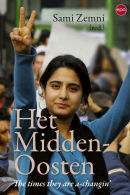(27-05-2013) Why Maliki Must Go
(17-05-2013) Sectarianism in Iraq stoked by Syrian war
(16-05-2013) Baghdad market attacks, shootings in north kill 17
(27-05-2013) Why Maliki Must Go
(03-05-2013) Al-Maliki is directing Iraq to war once again
(25-04-2013) Iraqi forces kill 43 Iraqis and destroy six mosques
(23-04-2013) Hawija: Chronicle of an Announced Mass Murder
(21-04-2013) Boston on the Tigris
The BRussells Tribunal is independent and wants to remain independent.
The BRussells Tribunal is an activist think tank and peace organisation with a special focus on Iraq. Read more...



 The times they are a-changin' is het eerste grondige Nederlandstalig overzicht dat voorbij oppervlakkigheden en algemeenheden wandelt, en ook nog eens de hele regio bestrijkt, van Egypte en Tunesië tot Marokko, Libië, Syrië, Libanon, Palestina, Jemen, Jordanië, Irak, Bahrein en Israël. Daar bestaat een woord voor: een standaardwerk.
The times they are a-changin' is het eerste grondige Nederlandstalig overzicht dat voorbij oppervlakkigheden en algemeenheden wandelt, en ook nog eens de hele regio bestrijkt, van Egypte en Tunesië tot Marokko, Libië, Syrië, Libanon, Palestina, Jemen, Jordanië, Irak, Bahrein en Israël. Daar bestaat een woord voor: een standaardwerk.